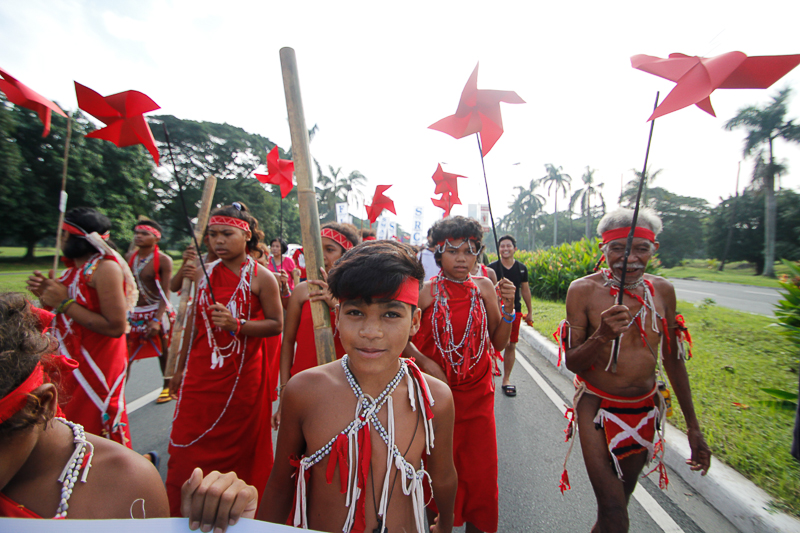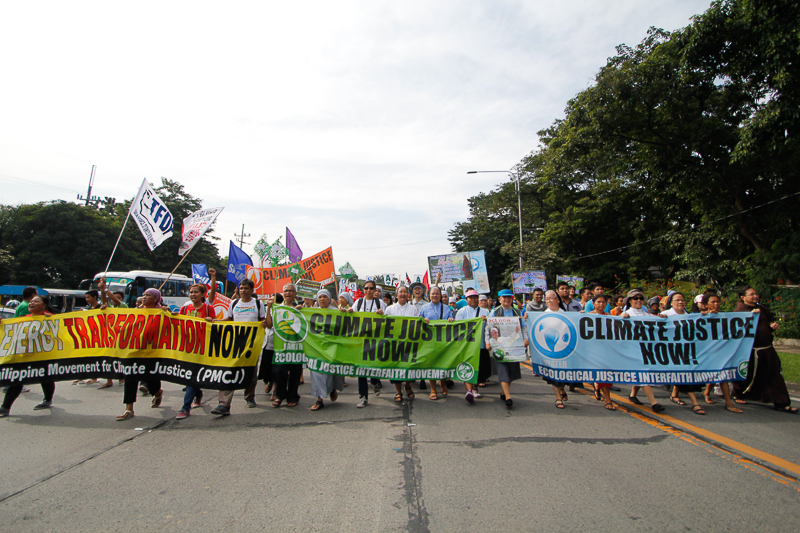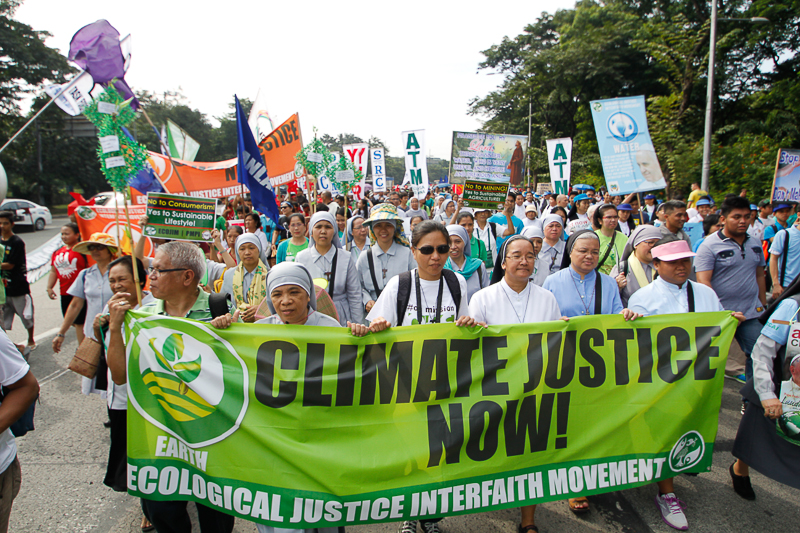By Chuck Baclagon

Present in the march are a delegation of Dumagat Agta’s who inhabit the dense forest on the eastern flank of the Sierra Madre mountains in Luzon. They are currently caught in an ongoing struggle against the construction of mega dams and massive logging that encroaches their ancestral lands. Photo: AC Dimatatac
If there’s anything that I learned from my two-thirds of a master’s degree in theology, it is that: faith, hope and love is manifested in action. This was the thought that occupied my mind as I joined one of the four contingents that merged at the Quezon Memorial Circle, in Metro Manila for an uncanny celebration of the feast of Saint Francis of Assisi – by marching to demand climate justice to amplify the voice of vulnerable countries like the Philippines in the upcoming climate talks in Paris later this year.
It gathers more than 3,000 people ranging from members of clergy from various faiths present; to different indigenous peoples from various parts of the Philippines who are currently leading resistance to mining, mega dams and displacement from their ancestral domains; to social justice activists, to environmental advocates, to the youth whose generation has the most to gain or lose should we all fail to give decisive action on climate change.
The crowd was a convergence of delegations of groups that assembled on different points in the city where they organized according to advocacies related to the 4 elements: earth (land rights, agriculture, deforestation), water (water access, pollution, fisheries and dams), air (transport, incineration), fire (energy, climate change).

On the feast of St. Francis of Assisi church people, indigenous peoples, environmentalists, human rights advocates and social justice activists led by the Ecological Justice Interfaith Movement walk to demand climate justice as a lead up of activities that will amplify the voice of vulnerable countries like the Philippines in the upcoming climate talks in Paris in December 2015. Photo: AC Dimatatac
Following the path of Francis of Assisi
The march was organized by the Ecological Justice Interfaith Movement (ECOJIM), formed by the collective desire of various interfaith groups to preserve and protect the integrity of creation and human rights, embolden people of all faiths and beliefs to follow the example of genuine concern for the environment and welfare of all creatures that St. Francis lived out, as a response to the worsening global ecological crisis that is slowly defining our times.
According to ECOJIM, the beauty and the lesson that was the life of St. Francis of Assisi continues to be a fountain of inspiration and wisdom that humanity today can glean valuable insights from. In the face of waning care and concern for all creatures, as we continuously disparage and destroy natural ecosystems for the sake of profit and instant gratification, we can look at the example of one man who valued all and cared for all as a response to the extravagant love showered upon him by his creator.

The event aimed to intensify the call for ecological justice. Photo: AC Dimatatac
Living within limits
“The natural environment is a collective good… If we make something our own, it is only to administer it for the good of all. If we do not, we burden our consciences with the weight of having denied the existence of others,” writes Pope Francis in Laudato Si.
It cannot be denied that great inequality and poverty exists today. Only 17% of the world’s population consumes 80% of the world’s resources, leaving almost 5 billion people to compete for the remaining 20%. This scarcity of resources for the world’s poorest deprives the majority of their basic human rights and makes them more vulnerable to further exploitation and abuse.
A development paradigm anchored on this system only further widens the gap between the rich and the poor while slowly destroying the resources and the environment that we need in order to survive. We must be hopeful that there is a way to satisfy the basic needs of all without exploiting the earth beyond its limits.
The environment is not merely a tool that we use for short-term self-gain and self-interest. Similar to the way that St. Francis addressed all creatures as brothers and sisters, we must also be mindful of the inherent goodness possessed by all creatures. Allowing ecosystems, species, and cultures to go extinct due to our neglect is one of the many things that we need to repent of while we still have the time and opportunity to turn things around.
Any harm done to the environment is harm done to humanity. This statement made by Pope Francis during his recent trip to the United States encapsulates the essence of why we should fight for our environment. The destructive impacts of environmental degradation and climate change choose no one; economic lines separating the poor from the rich are blurred during disasters and will sooner or later be eradicated as these impacts worsen over time. While there are those more prepared and, in effect, recover faster from these impacts, compassion for the less privileged means that we acknowledge that their lives matter as much as anyone’s. We must save their lives if we are to save our own.
Our common cause: climate action
The march also stands in solidarity with the climate pilgrims who will walk from Rome to Paris to call attention to climate change and bring the message of Laudato Si to the climate negotiations later this year. The people of Palawan who has recently taken their struggle to the national government to keep coal from their pristine environment and to the Pacific Climate Warriors are beginning their 3-day prayer vigil or Fa’anoanoa at the Vatican.
As our call reaches more ears and more hearts, may this be a source of strength and hope that we will still be able to see better days for our planet. Climate change transgresses boundaries, of both natural and human-defined separations, of communities, of nation-states, of lands, of waters, of near and distant neighbors, of rich and poor, of different cultures, of the past and the future. Many of its effects know no boundaries. Climate change reminds us that we are all in this together.
As humanity rightly becomes accountable for the damage and destruction it has inflicted upon our home, it must also be acknowledged that only humanity can save it. With the collective awakening, conversion, and action of all, a bright and secure future will still be achieved for all.
